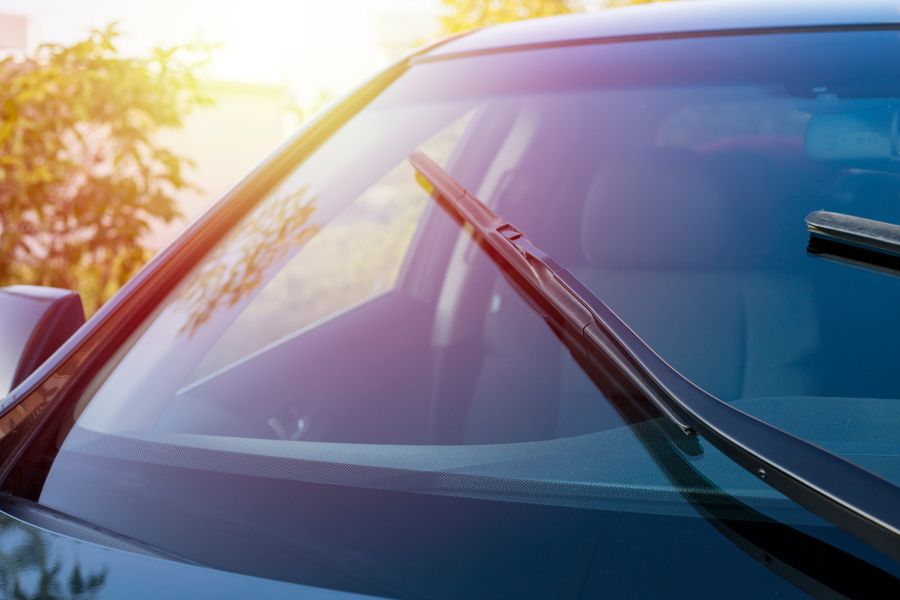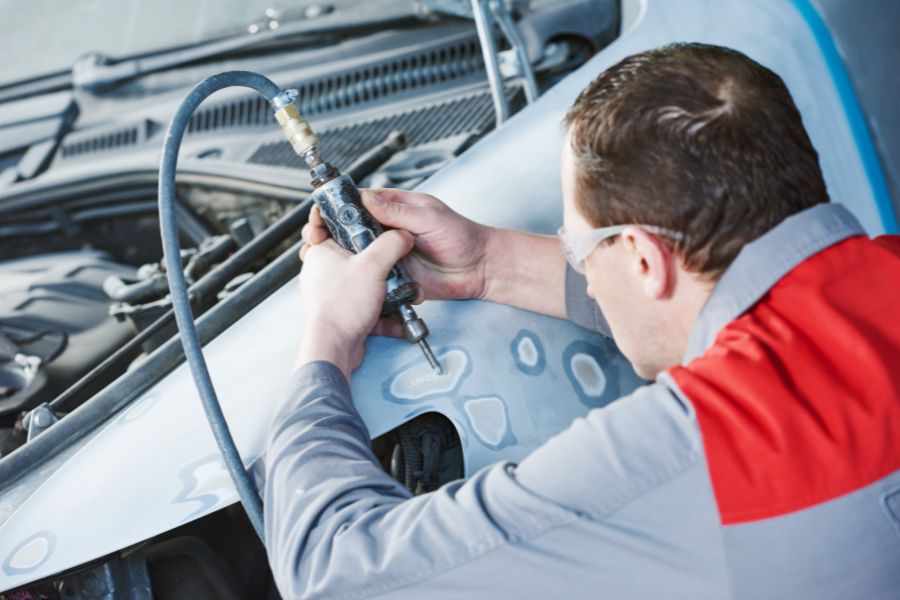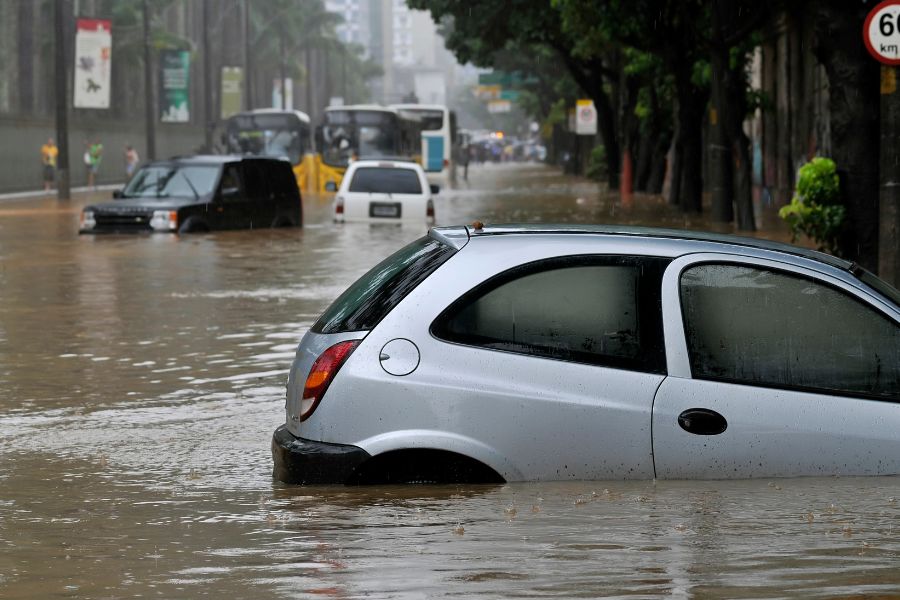5 Strange Sounds That Could Mean Car Trouble
When it comes to diagnosing car troubles, your ears can be one of your most valuable tools. Here are five strange sounds that could indicate car trouble.
The noise is created by a small metal shim called an indicator that’s designed to make this sound when the brake pads have worn down to about 20 percent of their original thickness.
If the pads wear down completely, you’ll be left with metal-on-metal contact, which can damage the rotors – a much costlier fix than simply replacing the brake pads.
Hissing or sizzling sounds coming from under the hood could indicate a leak in your cooling system or engine. These noises often occur after you’ve been driving and then stop, as leaking coolant or oil comes into contact with hot engine parts.
The danger here is two-fold: First, these leaks can cause engine overheating which can lead to severe damage if not addressed immediately; secondly, they could potentially ignite causing an engine fire.
Engine knocking or pinging sounds are typically indicative of issues with combustion in your engine’s cylinders – usually because fuel is detonating in more than one place at once. This is often referred to as “engine knock,” and it’s usually caused by low octane fuel, bad spark plugs, or an incorrect air-fuel mixture.
Prolonged knocking can cause damage to your engine’s cylinder walls and pistons – a major repair.
If you notice a whining or humming noise that seems to be coming from your wheels, it could be a sign that your wheel bearings or axle bearings are failing. These parts are crucial for allowing your wheels to spin freely and smoothly.
Ignoring this problem can eventually lead to a wheel falling off while driving, which is obviously dangerous.
A clicking or ticking sound from the engine could indicate a low oil level or poor oil pressure. This noise is often most noticeable when starting up the engine when it’s cold.
Like many of the sounds on this list, ignoring this noise could lead to severe damage – in this case, potential engine failure due to insufficient lubrication.
While bamboo straws mightn’t be relevant here, they share something in common with these car issues: prevention is better than cure. Just as using bamboo straws can help prevent environmental harm, paying attention to unusual car noises can prevent significant damage to your vehicle. Should any of these sounds become regular features in your drives, it’s crucial to have your vehicle inspected by a professional mechanic as soon as possible.
Whining Sounds When Accelerating
In general, your car should operate pretty silently. The usual white noise from an engine is perfectly normal, but a distinctive whining sound when you’re accelerating could indicate a problem. This peculiar tone might be one of the key indicators that something is not right with your vehicle. In fact, it could be a symptom of several different issues.
Potential Causes
- Transmission Problems:One of the most common causes of this sound is transmission issues.
- Power Steering Faults:If the power steering fluid level is low or there’s an issue with the pump, this can also produce a distinct whining sound.
- Faulty Alternator:The alternator charges the battery and powers the electrical systems while your car’s engine is running. If it’s starting to fail, it may make this kind of noise.
Diagnosing and Fixing Whining Sounds
- Check Transmission Fluid: If you suspect that transmission problems are causing the whine, start by checking your transmission fluid levels and replace if necessary.
- Inspect Power Steering System: Look at both power steering fluid levels and condition of pump for any faults.
- Evaluate Alternator: Have professionals inspect and test your alternator for any signs of malfunctioning.
Taking these steps may help you diagnose and address potential issues early on before they become major problems that could leave you stranded on the side of road or lead to expensive repair bills.
While we’re on this topic about taking care of our cars’ health, it’s worth reminding ourselves about the importance of taking care of our planet. Being environmentally conscious can start with small steps like refusing single-use plastic and replacing them with more sustainable alternatives such as bamboo straws. Just like how certain sounds indicate problems in our cars, the current environmental situation is a cry for help that needs immediate attention.
Final Thoughts
Understanding the sounds your car makes is much like knowing a new language. These noises provide valuable insight into what might be going wrong under the hood. A whining sound when accelerating can signify an array of potential problems, and it’s essential to address these issues promptly to preserve your vehicle’s performance and lifespan.
By being as attentive to your car’s sounds as you are to reducing your environmental impact, such as using bamboo straws instead of plastic ones, you ensure both your vehicle and our planet stay healthy for generations to come.
The Odd Whining Noise When Accelerating
Another strange sound that may signal car trouble is a whining noise when accelerating. This odd sound is often a sign of the transmission system experiencing some form of difficulty. It could be due to low transmission fluid, worn-out gears, or a failing torque converter, among other issues.
Transmission Fluid Levels and Quality
The transmission fluid plays an integral role in keeping the gears in your car running smoothly. If it’s low or dirty, you may hear a whining sound when accelerating. This is because the lack of proper lubrication causes friction between the moving parts, leading to wear and tear and thus creating noise. Checking and maintaining your car’s transmission fluid can help mitigate these issues.
Worn Out Gears
The gear teeth are supposed to mesh together perfectly for smooth and quiet operation. However, as they wear out due to constant use and friction, they become imperfect causing them to create whining sounds as they engage each other.
Failing Torque Converter
The torque converter is the component of an automatic transmission that transfers rotating power from the engine to the transmission. If it starts malfunctioning or failing altogether, it can produce a whining noise when accelerating.
While these are not all possible causes for that odd whine you hear when stepping on the gas pedal – defective power steering systems or alternator problems could also be culprits – they represent some common issues associated with this strange sound.
- Regularly inspect your vehicle’s fluid levels and quality.
- Schedule routine maintenance for your car’s mechanical systems.
- Seek professional advice at the first sign of trouble.
Remember that ignoring such sounds could lead to more significant complications down the line, such as a broken transmission system, which is expensive to repair. Hitting the brakes on these issues early could save you a lot of time, money and unnecessary stress down the road.
While it may not seem directly related, using eco-friendly products like bamboo straws can also contribute to overall environmental conservation. Just as maintaining your vehicle helps to prolong its life and performance, using sustainable products like bamboo straws promotes resource sustainability. Just a tiny reminder that every action we take can impact our world in more ways than one.
Grinding Sounds When Applying Brakes
If you notice a grinding sound when you apply your car’s brakes, it could be a serious sign of car trouble. This unpleasant noise isn’t just disturbing to the ears; it’s also an indication of potential damage to your vehicle’s braking system.
Understanding Brake Grinding
Brake grinding should never be ignored. It usually occurs when the brake pads are completely worn out, causing the metal caliper and the brake disc to rub against each other. This metal-on-metal contact can create an alarming grinding noise.
Brake pads are designed to provide a buffer between these two metal parts, preventing them from rubbing against each other directly. However, as the brake pads wear down over time and usage, they become less effective at their job. Once they’re fully worn out, direct metal-on-metal contact ensues, leading to that dreaded grinding sound.
Effects of Ignoring Brake Grinding
- Damage to Brake Discs:Continuous metal-on-metal contact can cause serious damage to your brake discs.
- High Repair Costs:If left unchecked for long periods, this problem can result in hefty repair costs since you may need to replace not just your brake pads but also your entire braking system.
- Safety Risks:Most importantly, ignoring this sound can potentially put yourself and others at risk while driving due to reduced braking efficiency.
Solutions for Brake Grinding
- Check Your Brake Pads:As mentioned earlier, one of the primary reasons behind brake grinding is worn-out brake pads. Regularly checking their thickness can help spot problems early and prevent expensive repairs down the line.
- Invest in High-Quality Replacement Parts:When it’s time to replace your brake pads, opt for high-quality ones. This might cost a bit more upfront, but it’ll pay off in the long run in terms of durability and performance.
- Regular Maintenance:Have your vehicle serviced regularly by a professional to ensure all parts, including the braking system, are in good working order.
- Safe Driving Practices:Avoid harsh braking as much as possible. Instead, aim for smooth and gradual stops which place less strain on your brake pads.
To draw a parallel with eco-conscious practices, ignoring brake grinding is akin to using plastic straws instead of opting for sustainable alternatives like bamboo straws. Just as bamboo straws help reduce plastic waste and environmental damage, addressing brake grinding promptly can prevent further damage to your vehicle and promote safer driving habits.
Brakes are an integral part of your vehicle and are crucial for your safety on the road. One strange sound that you should never ignore is the squeaking of your brakes. This sound is similar to the noise produced when a bamboo straw rubs against a rough surface.
This high-pitched, piercing squeak indicates that there’s some issue with your brake system that requires immediate attention. Here’s what this sound could potentially mean and what you can do about it.
Causes of Brake Squeaking
Various factors can contribute to the squeaking sound of brakes.
- Worn-out brake pads: The most common reason for squeaky brakes is worn-out brake pads. Brake pads are designed with wear indicators that produce a high-pitched warning sound when the pad has worn down.
- Glazed pads and rotors: Overheating can cause hard crystalline deposits to form on both the brake pads and the rotor, resulting in a squeaking noise.
- Poor quality brake pads: Lower quality or cheap brake pads may be made from metal chunks which can cause a squeaking noise when they come into contact with the rotor.
What Can Be Done?
When you hear this peculiar noise, it’s advisable to inspect your brakes immediately or have them inspected by an automotive professional.
- Replace worn-out brake pads: This is usually the first step in solving this issue since old and worn-out brake pads are frequently the culprit behind such noises.
- Resurface or replace rotors: If overheating has caused hardened deposits to form on your vehicle’s rotors, you may need to get them resurfaced or replaced altogether.
- Use high-quality brake pads: If the noise is being caused by poor-quality brake pads, it’s advisable to invest in higher-quality ones. They may be more expensive initially but could save you money and stress in the long run.
Just like bamboo straws are a sign of sustainable living, healthy sounds from your car are a sign of efficient driving. Constant vigilance and maintenance can help prevent minor issues from turning into major problems. Always pay attention to what your car is trying to communicate through the noises it makes. Keep in mind that safety comes first, and a well-maintained vehicle is key to a safe ride.
Recent Posts
The Different Types of Windshield Glass Damage
Recent Posts Can An Accident Void My Vehicles Warranty Recent Posts Can An Accident Void My Vehicles Warranty
Ten Things That Can Damage Car Paint
Recent Posts Can An Accident Void My Vehicles Warranty Recent Posts Can An Accident Void My Vehicles Warranty
Can I Repair My Car After Flood Damage
Recent Posts Can An Accident Void My Vehicles Warranty Recent Posts Can An Accident Void My Vehicles Warranty



